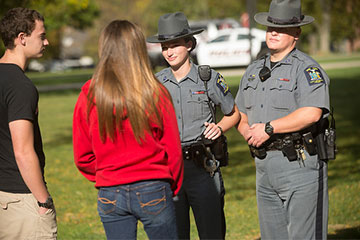
04/03/2018
In many communities, up to 20 percent of all service calls to law enforcement officers now deal with requests to assist a person undergoing a mental health crisis. College campuses are coping with similar challenges.
Recently, the SUNY Cortland University Police Department (UPD) took steps to improve relations between its officers and people experiencing mental health problems by joining the national “One Mind Campaign.”
“Whoever we deal with, it’s important for them to get the proper health care they need,” said SUNY Cortland Police Chief Mark DePaull.
The pledge includes specialized training for situations involving people in crisis with mental health issues and other steps aimed at making sure officers’ interactions are appropriate, understanding and effective.
Sponsoring the campaign are the 30,000 members of the International Association of Chiefs of Police (IACP), which provides training, technical assistance and recruitment services for law enforcement officers. Members are “dedicated to advancing the profession through advocacy, outreach, education and programs,” according to the IACP website.
In order to join the organization’s “One Mind” initiative to improve relations between police officers and individuals with a mental health challenge, SUNY Cortland UPD had to adopt four different requirements within in a 12- to 36-month period.
SUNY Cortland UPD completed it in six months. The measures involved:
- completing the One Mind Pledge.
- establishing a sustainable relationship with a local mental health organization by forming a partnership with the Cortland County Mental Health office.
- developing and implementing a model policy for UPD officers to apply when dealing with those struggling with mental health issues; and,
- securing sufficient mental health awareness training for all UPD officers, with at least 20 percent of the department completing the more intensive crisis intervention training.
The 40-hour crisis intervention curriculum is designed by local agencies to train a team of specialized officers to respond to calls that involve individuals with mental health disorders such as depression, anxiety or extreme stress. The curriculum includes education on various de-escalation techniques as well as live role-playing scenarios of officers responding to persons who need mental health assistance.
“It’s definitely going to be effective,” DePaull said. “Of the four goals we had to reach, the new model policy and the eight-hour training are going to make a huge difference in how we handle all our calls.”
DePaull decided to join the ranks of other law enforcement agencies implementing the One Mind Campaign in their everyday affairs due to the rising number of mental health related cases within the SUNY Cortland community.
“The Cortland County Mental Health office has been instrumental in helping us,” DePaull said. “They provided the training, and they’ve been a great resource that’s been able to connect us to a broader network of mental health experts.”
SUNY Cortland UPD took additional measures to ensure a safe community by entering into an agreement with Liberty Resources to use the agency's Mental Health Mobile Crisis Unit when responding to mental health-related calls. Liberty Resources also operates the Center for Brain Injury and Rehabilitation program in Cortland, N.Y.
“It is important to have a solid policy and properly trained officers in place so that we are able to assist our community members that may be in crisis,” DePaull said.
For more information regarding the One Mind Campaign, or to see a list of other law enforcement agencies registered with this program, visit the IACP website.
Prepared by Communications Office writing intern Hannah Bistocchi